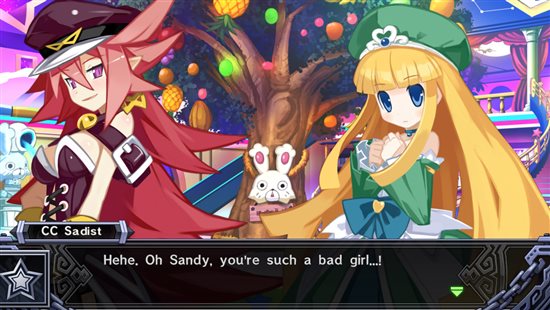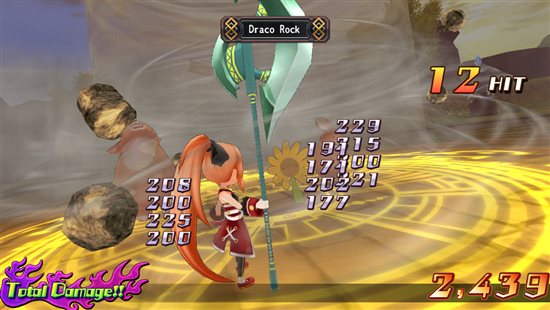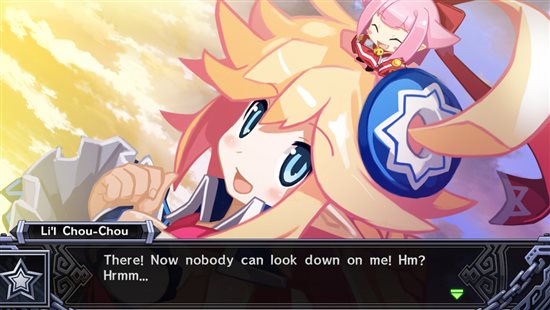Publisher: NIS America
Developer: Compile Heart/GCrest
Medium: Digital/Disc
Players: 1
Online: No
ESRB: T
I never played the original Mugen Souls game. Before I say anything else about Mugen Souls Z, I feel like that’s an important distinction to be made, since it very much seems like the sort of game that requires quite a bit of advance knowledge of the characters and the plots going into it. I base this feeling on the fact that, quite frankly, I had absolutely no idea what was going on most of the time. There are gods and goddesses and demon lords and multiple universes, and no matter how much of the ample dialogue I read, I never felt any closer to knowing what I was doing.
 Admittedly, there were plenty of points in the game where I didn’t want to know what was happening. Like the times where the extremely young-looking girls had baths for no obvious reason; that was kind of icky, no matter where the little clouds of steam were strategically placed. Also, when a baby was chewing on an older gentleman/demon lord, and he complained that her bites were starting to get weaker; coupled with the prior knowledge that the demon lord was “kinky”, that also gave off weird vibes. In fact, I’ll just expand that out and say that if a cutscene was taking place, it’s highly likely that someone was going to say or do something kind of questionable.
Admittedly, there were plenty of points in the game where I didn’t want to know what was happening. Like the times where the extremely young-looking girls had baths for no obvious reason; that was kind of icky, no matter where the little clouds of steam were strategically placed. Also, when a baby was chewing on an older gentleman/demon lord, and he complained that her bites were starting to get weaker; coupled with the prior knowledge that the demon lord was “kinky”, that also gave off weird vibes. In fact, I’ll just expand that out and say that if a cutscene was taking place, it’s highly likely that someone was going to say or do something kind of questionable.
That said, no matter how disturbing some of the relationships in the game might be, they’re nothing compared to the sheer offensiveness of how the game looks. I cannot emphasize this fact enough: Mugen Souls Z is the very definition of “eyesore”. And it’s not just ugly, either; it’s bright, too. Really, really bright. So bright and gaudy that even I felt like my eyeballs were about to bleed and my brain was about to explode, and the very first thing I usually do when I play a game is crank the brightness as high as it will go. If you like eye-searing shades of neon, you’ve come to the right place (also, welcome to 2014 — I hope your journey from the early ’90s was a pleasant one), but otherwise, you might want to invest in shades if you want to play.
 Should you want to play, though? Despite my feelings about the characters and the graphics, I have to say that my answer isn’t as emphatic a “No!” as you might be expecting. For one thing, the games willingness to go way over the top in every respect works to its advantage when it comes to the action. Somehow, even the most mundane turn-based combat becomes super-exciting when you can knock thousands and millions and billions of points off your opponent’s life bar. Similarly, I may not be crazy about the flashing neon colors in normal circumstances, but when you’re annihilating your opponent with some insane combo, the color kind of adds to it all.
Should you want to play, though? Despite my feelings about the characters and the graphics, I have to say that my answer isn’t as emphatic a “No!” as you might be expecting. For one thing, the games willingness to go way over the top in every respect works to its advantage when it comes to the action. Somehow, even the most mundane turn-based combat becomes super-exciting when you can knock thousands and millions and billions of points off your opponent’s life bar. Similarly, I may not be crazy about the flashing neon colors in normal circumstances, but when you’re annihilating your opponent with some insane combo, the color kind of adds to it all.
And, I mean, considering how rote RPGs can seem some of the time, you have to admire one that just throws everything it can think of out there, without any regard for…well, anything, really.
Still, I wouldn’t recommend Mugen Souls Z unless you’re either a diehard fan of the first game and you want more, or you have a giant hole in your schedule that can only be filled by an RPG that has endless pages of text and dialogue. I can’t emphasize that last point enough, so I’ll say it again, even more clearly: there is a crapload of stuff to read here. Not necessarily useful stuff, since you’re pretty much on your own when it comes to learning to play, but everything else beyond that gets explained in minute detail. If you’re already lost, of course, very little of that text is helpful, but nonetheless, this is a game that has lots of ideas and offers lots of options, and it never shies away from telling you about all of them. In other words, the game is even over the top when it comes to instructions, which, like everything else about Mugen Souls Z, is equal parts endearing and overwhelming.
 And those two adjectives really capture everything there is to know about the game: Mugen Souls Z is both endearing and overwhelming. The latter is obvious, in that the game’s enthusiasm seems like it would be exhausting if you were to play the game all the way to the end (which, I’ll confess, I didn’t come anywhere close to doing). At the same time, though, if you look at it in a more favorable light, this enthusiasm is kind of hard to hate. It’s obvious that this game was made by people who were bursting with excitement at everything they put into it, and even if the enthusiasm may seem a little misplaced (and occasionally creepy), it’s hard to hate it too much. Go into it with your eyes open, and it may end up being a pretty fun experience.
And those two adjectives really capture everything there is to know about the game: Mugen Souls Z is both endearing and overwhelming. The latter is obvious, in that the game’s enthusiasm seems like it would be exhausting if you were to play the game all the way to the end (which, I’ll confess, I didn’t come anywhere close to doing). At the same time, though, if you look at it in a more favorable light, this enthusiasm is kind of hard to hate. It’s obvious that this game was made by people who were bursting with excitement at everything they put into it, and even if the enthusiasm may seem a little misplaced (and occasionally creepy), it’s hard to hate it too much. Go into it with your eyes open, and it may end up being a pretty fun experience.

